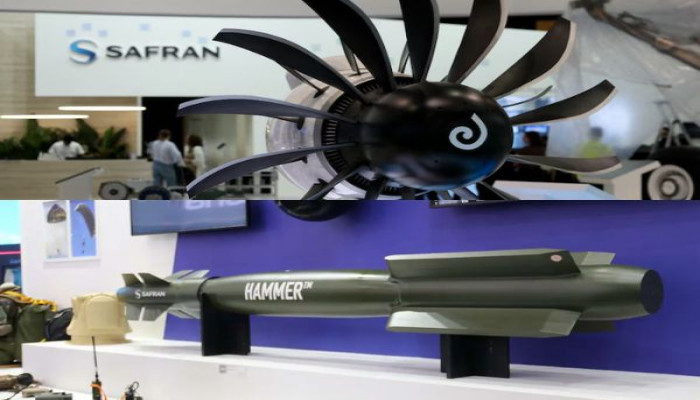India, France sign joint venture cooperation to make HAMMER precision weapons in India
- In Reports
- 08:44 PM, Nov 25, 2025
- Myind Staff
India’s state-run Bharat Electronics Limited and the French company Safran Electronics and Defence have signed a joint venture cooperation agreement to make the Highly Agile Modular Munition Extended Range (HAMMER) smart precision guided air-to-ground weapon system in India, marking an important step in their defence partnership.
The agreement formalised the intent that both sides had already shown in the memorandum of understanding signed on 11 February 2025 during Aero India, and the defence ministry said in a statement on Monday that this move confirmed their shared interest in creating a joint venture company in India.
The ministry said the planned joint venture company will be a private limited firm with equal shareholding, and it will focus on local manufacturing, supply and maintenance of the HAMMER system that is used with Rafale jets of the Indian Air Force and the Navy’s Rafale Marine aircraft, to meet the needs of both services.
The first phase of production transfer will start with semi-knocked-down kits, and later move to full-scale local manufacturing, and the indigenisation level is expected to reach around 60 per cent, covering mechanical structures, warhead sub-assemblies, electronic control units and guidance components made in India.
The ministry added that the transfer of production will take place in different phases, and BEL will take the lead in final assembly, testing and quality checks.
The HAMMER system is well known for its combat-proven accuracy and flexible design, and it uses GPS-assisted inertial navigation with an infrared or laser terminal guidance option to keep strike accuracy within a few metres.
By making the system within the country, India will improve operational readiness, cut dependence on imported equipment, and build a stronger supply chain during important missions.
The HAMMER system includes a guidance kit and a range extension kit attached to standard bombs, but it was not included in the 2016 contract for 36 Rafale jets and their weapons package because it was expensive and would have increased the total cost of the deal.
The system was later bought through emergency procurement powers that allow the Indian Air Force to make urgent purchases of up to Rs 300 crore.
HAMMER was also chosen because the Rafale lacked a suitable short-range air-to-surface precision missile of around 70 km to hit hardened targets like bunkers. Although the original plan was to use Spice 2000 kits that are already fitted on the Mirage 2000 fleet, the situation with China pushed the Air Force to choose HAMMER as a quicker and more cost-effective option.
The HAMMER is designed to be highly agile and works well in mountainous terrain such as Ladakh. For the Indian Air Force, having HAMMER produced in India will bring better mission flexibility and sustained high-tempo operations, and by offering both short-range precision strikes and medium-range penetration missions, the system meets several tactical needs without large stocks of different imported munitions.







Comments